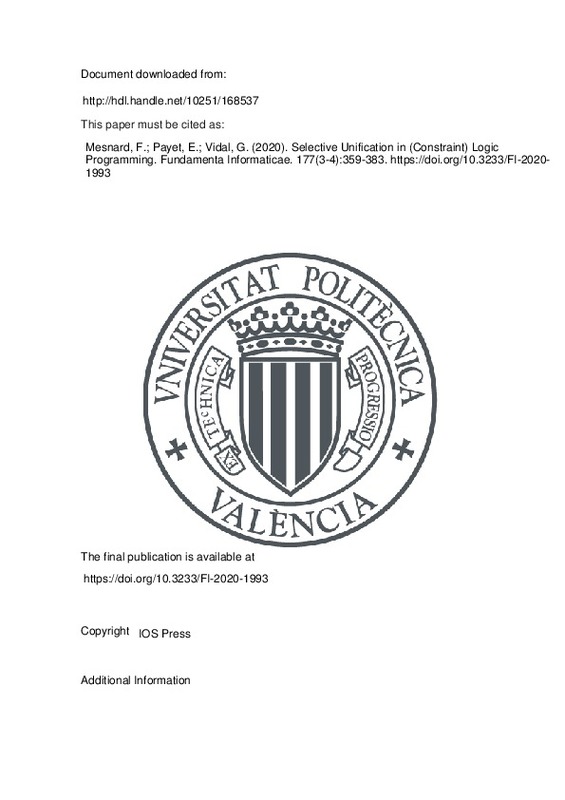JavaScript is disabled for your browser. Some features of this site may not work without it.
Buscar en RiuNet
Listar
Mi cuenta
Estadísticas
Ayuda RiuNet
Admin. UPV
Selective Unification in (Constraint) Logic Programming
Mostrar el registro sencillo del ítem
Ficheros en el ítem
| dc.contributor.author | Mesnard, Fred
|
es_ES |
| dc.contributor.author | Payet, Etienne
|
es_ES |
| dc.contributor.author | Vidal, Germán
|
es_ES |
| dc.date.accessioned | 2021-06-30T03:30:48Z | |
| dc.date.available | 2021-06-30T03:30:48Z | |
| dc.date.issued | 2020 | es_ES |
| dc.identifier.issn | 0169-2968 | es_ES |
| dc.identifier.uri | http://hdl.handle.net/10251/168537 | |
| dc.description.abstract | [EN] Concolic testing is a well-known validation technique for imperative and object oriented programs. In a previous paper, we have introduced an adaptation of this technique to logic programming. At the heart of our framework lies a specific procedure that we call "selective unification". It is used to generate appropriate run-time goals by considering all possible ways an atom can unify with the heads of some program clauses. In this paper, we show that the existing algorithm for selective unification is not complete in the presence of non-linear atoms. We then prove soundness and completeness for a restricted version of the problem where some atoms are required to be linear. We also consider concolic testing in the context of constraint logic programming and extend the notion of selective unification accordingly. | es_ES |
| dc.description.sponsorship | This work has been partially supported by the EU (FEDER) and the Spanish Ministerio de Ciencia, Innovacion y Universidades/AEI under grant TIN2016-76843-C4-1-R and by the Generalitat Valenciana under grant Prometeo/2019/098 (DeepTrust). | es_ES |
| dc.language | Inglés | es_ES |
| dc.publisher | IOS Press | es_ES |
| dc.relation.ispartof | Fundamenta Informaticae | es_ES |
| dc.rights | Reserva de todos los derechos | es_ES |
| dc.subject | Logic programming | es_ES |
| dc.subject | Constraint logic programming | es_ES |
| dc.subject | Concolic testing | es_ES |
| dc.subject | Unification | es_ES |
| dc.subject.classification | LENGUAJES Y SISTEMAS INFORMATICOS | es_ES |
| dc.title | Selective Unification in (Constraint) Logic Programming | es_ES |
| dc.type | Artículo | es_ES |
| dc.identifier.doi | 10.3233/FI-2020-1993 | es_ES |
| dc.relation.projectID | info:eu-repo/grantAgreement/MINECO//TIN2016-76843-C4-1-R/ES/Métodos rigurosos para el Internet del futuro/ | es_ES |
| dc.relation.projectID | info:eu-repo/grantAgreement/MINECO//TIN2016-76843-C4-1-R/ES/METODOS RIGUROSOS PARA EL INTERNET DEL FUTURO/ | es_ES |
| dc.relation.projectID | info:eu-repo/grantAgreement/GVA//PROMETEO%2F2019%2F098/ES/DeepTrust: Deep Logic Technology for Software Trustworthiness/ | es_ES |
| dc.rights.accessRights | Abierto | es_ES |
| dc.contributor.affiliation | Universitat Politècnica de València. Departamento de Sistemas Informáticos y Computación - Departament de Sistemes Informàtics i Computació | es_ES |
| dc.description.bibliographicCitation | Mesnard, F.; Payet, E.; Vidal, G. (2020). Selective Unification in (Constraint) Logic Programming. Fundamenta Informaticae. 177(3-4):359-383. https://doi.org/10.3233/FI-2020-1993 | es_ES |
| dc.description.accrualMethod | S | es_ES |
| dc.relation.publisherversion | https://doi.org/10.3233/FI-2020-1993 | es_ES |
| dc.description.upvformatpinicio | 359 | es_ES |
| dc.description.upvformatpfin | 383 | es_ES |
| dc.type.version | info:eu-repo/semantics/publishedVersion | es_ES |
| dc.description.volume | 177 | es_ES |
| dc.description.issue | 3-4 | es_ES |
| dc.relation.pasarela | S\427879 | es_ES |
| dc.contributor.funder | Generalitat Valenciana | es_ES |
| dc.contributor.funder | European Regional Development Fund | es_ES |
| dc.contributor.funder | Ministerio de Economía y Competitividad | es_ES |







![[Cerrado]](/themes/UPV/images/candado.png)

